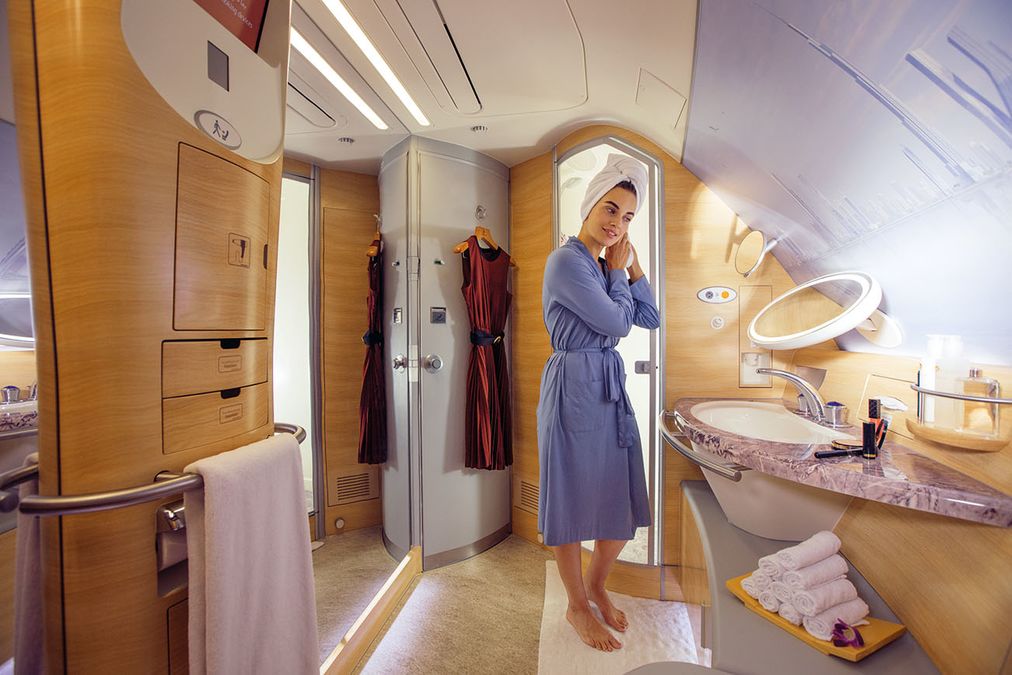Imagine reclining in one of Emirates’ First Class suites, sipping champagne, dozing in near-silence, and then… the shriek of a toddler. That scene might become less likely now…

As of 15 August 2025, Emirates quietly introduced a change to its Skywards loyalty programme, where children aged eight or younger are no longer eligible to book First Class seats using Skywards Miles, whether through full award tickets or upgrades. Importantly, this restriction does not apply to First Class tickets bought with cash or credit cards.
This is a big deal, especially for families who’ve been planning to use their hard-earned and cleverly accumulated miles to experience the dreamy pointy end. In essence, what matters now isn’t just cost, but your payment method.
Who flies Emirates First Class?
To better understand the implications, let’s take a quick look at who typically sits in Emirates’ First Class cabin. We can safely say that these passengers:
- Tend to have substantial resources (financial or in miles), because First Class is among the most expensive cabins, especially on long-haul flights.
- May be flying for business, special occasions, or just wanting maximum comfort, peace and quiet, and very little disturbances.
- Expect ultra-premium service including suites with privacy doors, fine dining, sometimes showers on long-haul A380s, top-tier lounge access, etc.
- Are likely loyalty programme high flyers, meaning they’ve been accumulating many Skywards Miles via frequent business travel, credit card partnerships, etc.
So at a glance, it’s clear that Emirates’ First Class is the pinnacle of premium flying, and it’s not for everyone. What this new change does is adjust who of those loyal programme members can use miles in that cabin.
Why some might celebrate this move

Every decision has its pros and cons. Here are some arguments in favour of the change:
- Quieter, more refined First Class experience
Passengers redeeming miles for First expect something close to perfection (or as close as possible). Removal of very young children in that context may mean fewer disturbances, more calm and quiet, and potentially better rest. - Rewarding premium loyalty members
Since award availability is often limited, excluding the youngest from those awards may mean fewer “seat-blocking” or over-demand by families, leaving more opportunity for those without small children who value quiet. - Clearer distinction in how rewards are handled
It aligns with other premium-cabin policies (quiet zones, adult-only areas in some airlines), giving a differentiated product that distinguishes between paying cash vs using rewards. - Potentially fewer complaints
Noise, safety, disturbance issues are among the top complaints on flights, often linked to children. This change might reduce such negative feedback specifically in First Class award redemptions.
Where this might miss the mark
However, no policy is perfect, and this one has its downsides, namely:
- Unfair distinction by payment type
It feels arbitrary to ban children when seat is redeemed by miles, while allowing them if the ticket is paid in cash. All First Class seats offer the same cabin and service; why should the payment method make a difference for whether your child can fly there? Is this seemingly two-tiered privilege system fair? - Penalising families who rely on miles
Families often save miles precisely to afford premium cabins. For many, paying cash for First Class is prohibitively expensive. Removing the ability to use miles with children under nine disproportionately affects families who can’t pay full First Class fares. - Emotional/ethical concerns
Travel is also about togetherness. Parents will feel excluded or disadvantaged; children might miss out on luxury experiences. Could this be viewed as discriminatory, even if not legally so? - Complex enforcement and customer confusion
Since Emirates still allows cash tickets in First Class, the policy could lead to confusion or misunderstandings at booking vs boarding. Also, what about partner-booked awards? What about upgrade rules? Ambiguity may lead to upset travellers. - Maybe a slippery slope
If other airlines see this as a successful move, more may follow suit to tighten access to First Class travel further. Could the beginning of excluding eight-and-under kids expand or lead to more restrictive “premium-only” zones?

Is there a way to strike a balance?
Being frequent flyers ourselves, we totally get it. Flying First Class, a premium product, comes with premium expectations. When splurging cash or miles to enjoy the luxuries of the pointy end, you expect more than space and fine food. You also want and expect a peace and quiet.
So is this move fair? Does it lack generosity?
Pay cash, and you can bring kids to First Class. Use miles, and kids under nine aren’t allowed. This division might just come across somewhat elitist for some.
So how could this be tackled? Perhaps Emirates (or other airlines, if they follow) might consider a compromise by designating certain First Class seats as “quiet reward seats” where no children under a certain age are allowed; and keep others more “family-friendly”. That way, there’s choice.
This new rule sure makes for an interesting talking point on how airlines can strike a win-win-win scenario with luxury, loyalty, and family travel. Finally, is this move inadvertently forecasting the future of premium travel becoming less universally accessible, and more contingent on payment method than ever before? Watch this space.


